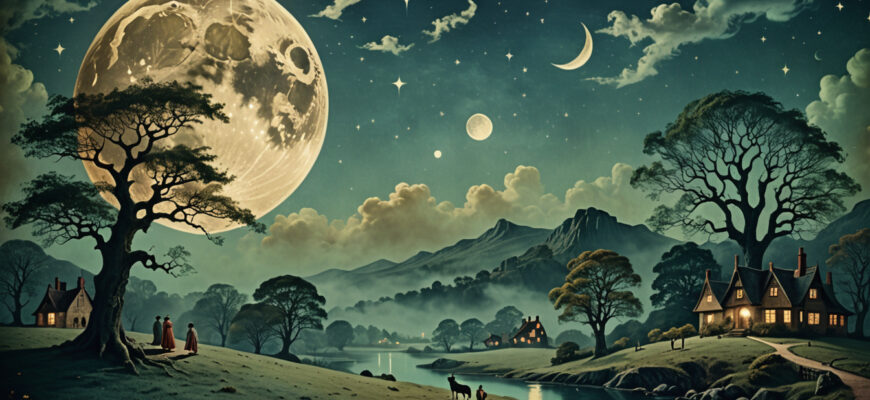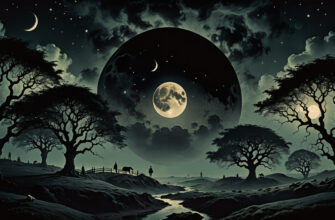Dreams of a big, luminous moon don’t just float by casually. They often show up when there’s something deep stirring beneath the surface—whether that’s the close of a chapter or a new insight ready to break through. Across many cultures, the moon has long been a symbol carrying heavy emotional weight. It embodies endings, revelations, and the shifting tides of feeling that sometimes catch us off guard. When the moon appears large and radiant in a dream, it acts like an internal spotlight, urging attention to the cycles unfolding in life and the changes asking for space to happen.
- The Big Moon In Dreams: What It Means To Listen Inwardly
- Ancient Symbolism And Modern Astrology Behind Lunar Dreams
- Emotional And Spiritual Dimensions Of Dreaming The Moon
- Interpreting the Big Moon in Different Dream Contexts
- Cycles, Endings, and Transformations in Lunar Dreams
- Ancestral and Collective Layers within Moon Dreams
The Big Moon In Dreams: What It Means To Listen Inwardly
Throughout history and across spiritual traditions, the moon often signals the close of a cycle. Imagine it as the final scene before a curtain falls, the moment a story wraps up or something once hidden steps into the light. Dreaming of a big moon frames that idea vividly—you might be processing endings, or invited to fully feel what’s been brewing inside without rushing the flow.
This glowing lunar presence invites a reckoning with buried feelings and parts of your own story that might be ready to shift. Think about those emotional tides: perhaps old grief, forgotten dreams, or untended heartbreak is coming up to be named. In this dream space, the moon’s brightness encourages reflection on what transformation looks like for you personally.
Some questions to sit with after waking from such lunar dreams could be:
- What parts of your life feel like they’re reaching a natural conclusion?
- Are there stories or patterns you’re ready to release or transform?
- How can you make space for the emotions this dream is stirring?
By leaning into those answers, dreaming of a big moon can feel less like confusion and more like an embrace—gently asking you to listen to your inner cycles and honor the changes moving through you.
Ancient Symbolism And Modern Astrology Behind Lunar Dreams
The moon has never been just a bright orb in the sky. It carries layers of meaning drawn from old myths, folklore, and ancestral wisdom—and through a queer and feminist lens, those stories gain new, powerful colors. The moon represents cyclical time, feminine energy, and deep intuition that resists linear, patriarchal clocks. Starting from this place reminds us that moon dreams connect personal rhythms to cultural memory and collective transformation.
Astrologically, lunar dreams align closely with the phases of the moon, as well as where the moon sits by zodiac sign and house in a chart. For example, a full moon in Scorpio might signal deep emotional unveiling, while a moon in Pisces could highlight spiritual or artistic yearning. These placements add context to the dream’s feeling and message.
A big moon dream often correlates with heightened emotional intensity, reflecting what astrologers call the cosmic weather report—the energetic pulses that influence collective moods and individual shadows alike. It’s less about predicting the future and more about guiding your self-awareness. The moon in dreams is less a fortune teller and more a midwife to your inner growth, lighting the way through emotional landscapes that might otherwise feel hard to map.
| Moon Phase | Symbolic Meaning | Dream Associations |
|---|---|---|
| New Moon | Beginnings, intention-setting | Dreams of starting fresh, new opportunities |
| Full Moon | Completion, illumination, emotional peak | Dreams highlighting revelations or endings |
| Waning Moon | Release, letting go, reflection | Dreams urging healing and shedding old layers |
| Waxing Moon | Growth, building, creativity | Dreams calling attention to expansion and possibility |
Emotional And Spiritual Dimensions Of Dreaming The Moon
Some dreams arrive when a personal turning point is at hand. Lunar dreams often mark a threshold in growth or healing, the quiet edge where the past and future intersect. The big moon casting light in these dreams invites the releasing of what no longer serves—be it outdated beliefs, pain stored deep within, or fear slowing down your spirit.
The moon’s glow doesn’t just expose shadows; it also illuminates intuition, ancestral whispers, and the delicate, unseen parts of the self. Through these dreams, fragments of stories passed down or self-care long neglected can rise into awareness, offering an opportunity to honor your full complexity.
To get curious about your own inner moon, ask: What message feels urgent? What emotion or truth bubbles just beneath the surface? How might this dream be an invitation to engage more tenderly with your own rhythms? The answer isn’t always easy, but it is always worth your attention.
Owning this luminous power means recognizing that the moon isn’t simply a distant light but a reflection of your own capacity for transformation. You were born for this reckoning—the bravery of meeting yourself in the dark and trusting the process of unfolding into something new.
Interpreting the Big Moon in Different Dream Contexts
Ever wake from a dream with a massive moon filling the sky and wonder what it’s trying to tell you? The big moon in dreams isn’t just a celestial show; it’s loaded with meaning tied to emotions, identity, and transformation. When the moon glows vibrantly, bright and undeniable, it often signals moments of clarity. This kind of moon is like your soul’s spotlight—celebrating your true self and inviting you to own your identity with pride. Imagine dreaming of a moon so luminous it feels like a party in your own psyche, where insights flow freely and authenticity takes center stage. The feelings that bubble up can be joy, relief, or the fierce courage to be seen.
Now picture that moon hanging impossibly close, like you could reach out and touch it. This closeness symbolizes intimate connection with your intuition—those inner whispers and gut feelings getting louder. Such dreams invite fresh starts and new beginnings, where trusting yourself matters more than ever. You might wake up feeling hopeful, energized, or tender, ready to lean into what your instinct is nudging you toward.
But what about when the moon’s face is hidden or eclipsed? That’s where shadows gather, and the dream calls you to confront secrets, endings, or uncomfortable truths. These moments can stir anxiety, sadness, or even grief, yet they shine a necessary light on parts of your life ready to close. These dreams ask you to pause, face what’s beneath the surface, and prepare for transformation.
Try this on:
- Dreaming of a brilliantly glowing moon might bring a flood of pride or a sense of celebration right after a breakthrough in self-understanding.
- A moon so near you reach out in your dream could spark feelings of warmth and promise, encouraging you to start a new creative or emotional chapter.
- If the moon’s obscured, you might find the dream heavy with unease or a quiet urging to honor grief and let go.
Each moon dream carries its own emotional pulse, gently guiding reflection on how you hold your feelings, approach change, and hear the quiet but persistent voice within.
Cycles, Endings, and Transformations in Lunar Dreams
Have you noticed your feelings or creative energy ebb and flow like a tide? That’s your personal moon rhythm tapping in. Lunar dreams often mirror those cycles—emotional peaks, lows, bursts of creativity, and moments when energy feels drained. Recognizing these rhythms helps ground you in your own process instead of fighting against it or feeling lost.
Endings show up as natural markers in lunar dreams. The moon often signals when a season in your life is wrapping up—whether that’s a relationship, a career phase, or a mindset. These liminal spaces can feel unsettling since endings are messy and uneven, yet they’re essential for growth. The moon gently reminds us that closing doors paves the way for new openings.
Tracking your transformation through dreams can feel like following secret threads. You might notice recurring images or feelings connecting to phases of change—sometimes confusion, sometimes clarity. Trusting this unfolding process requires slowing down, honoring your pace, and resisting the urge to force outcomes prematurely.
Here are some grounded, trauma-aware practices to hold space for these cycles:
- Create rituals that feel nourishing and safe, like lighting a candle or setting intentions during moon phases.
- Journal your dreams and emotions without judgment, letting whatever surfaces be seen and felt.
- Practice gentle movement or breathing exercises to stay connected to your body through emotional shifts.
- Reach out for community support or therapy when endings bring overwhelming pain.
These practices honor the lunar cycle’s wisdom, helping you work with—not against—your own natural pulse. Instead of rushing from one phase to the next, you learn to hold each moment tenderly, knowing transformation is a process marked by timing and grace.
Ancestral and Collective Layers within Moon Dreams
There’s a deep, often unspoken layer when a big moon shows up in dreams—a sense of connection to those who came before. With moonlight as a kind of bridge, you might feel ancestral whispers threading through your subconscious, blending personal healing with collective memory. These lunar images don’t just belong to you; they carry the weight and gifts of lineage.
The moon dances with stories of grief and resilience passed down across generations. In dreaming of the moon, you can hold space for honoring these emotions, recognizing how your present healing ties to those shared histories. This is especially potent through a queer and feminist lens, where lunar dreams amplify voices and experiences often erased or marginalized.
Moon dreams become more than private messages—they’re invitations to collective care, where joy and sorrow cohere in a communal heartbeat. Sitting with these dreams might reveal inherited strengths or call for mourning what needs release. They remind that you are woven into a larger fabric, your transformation linked to the healing of your ancestors and community.








